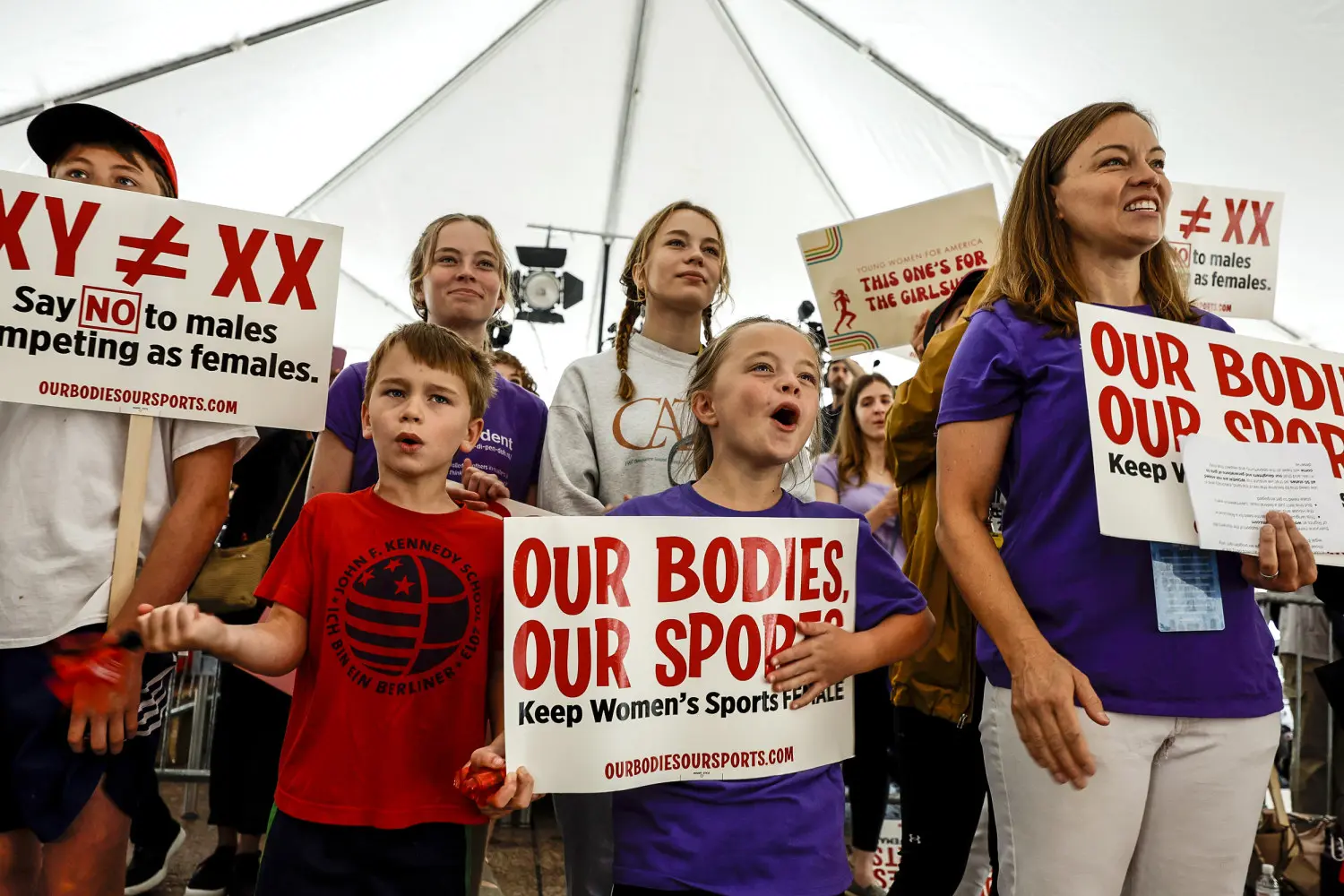sz. Two Oregon teenagers’ stand against a transgender athlete on the track and field medal podium became a defining moment for women’s rights and free speech in the United States. But in the aftermath of the action, sports fans are angry about the official decision of the ORGANIZING COMMITTEE.
In a bold act of defiance that captured national attention, two Oregon high school track and field athletes, Alexa Anderson from Tigard High School and Reese Eckard from Sherwood High School, refused to share the medal podium with a transgender competitor during the Oregon State Championships on May 31, 2025.

The event unfolded in the girls’ high jump final at Hayward Field in Eugene, where Anderson placed third and Eckard fourth, both ahead of the transgender athlete from Ida B. Wells High School, who tied for fifth.
As medals were awarded, the two teens stepped off their designated spots, turned their backs, and stood aside, sparking a viral video that ignited debates on fairness in women’s sports, free speech, and transgender participation policies.
Their protest highlighted growing frustrations among female athletes who argue that biological males retain physical advantages even after transitioning.
The incident quickly escalated when an Oregon School Activities Association (OSAA) official allegedly directed the girls to move out of the photo frame, excluding them from official images and initially withholding their medals.
Anderson later recounted the moment, stating that the official told them, “If you’re not going to participate, get out of the photos,” underscoring what they perceived as punishment for their viewpoint.
Sports fans and conservatives erupted in outrage over the OSAA’s handling, viewing it as viewpoint discrimination and a violation of First Amendment rights.
The backlash was immediate and widespread, with figures like Riley Gaines praising the teens for standing up against what many see as the erosion of women’s sports integrity.

In the months following, Anderson and Eckard, represented by the America First Policy Institute (AFPI), filed a federal lawsuit against the OSAA in July 2025.
The suit alleged that the organization violated their free speech by punishing them for protesting transgender inclusion, while selectively promoting other social causes like Pride Month and Black Lives Matter.
They claimed the OSAA’s actions created a hostile environment for athletes dissenting from the policy allowing transgender students to compete based on gender identity.
As of November 2025, the latest developments mark a significant victory for the teens: on November 7, a federal judge denied the OSAA’s motion to dismiss key parts of the lawsuit, allowing claims of viewpoint discrimination to proceed.
The ruling rejected the OSAA’s attempt to strike evidence of its past support for certain ideologies, highlighting perceived hypocrisy in punishing the girls’ protest.
Just hours after the decision, on November 7, Anderson and Eckard were honored at the seventh annual Fox Nation Patriot Awards, receiving the “Most Valuable Patriot” award for their courage.
Anderson expressed honor at the recognition, noting it was unexpected when they first stepped off the podium.
This legal win has energized supporters, who argue it exposes biases in athletic governing bodies and bolsters broader efforts to protect women’s sports under Title IX.

The controversy ties into larger national shifts, including President Trump’s February 2025 executive order barring transgender females from women’s sports in federally funded programs, which has prompted investigations into states like Oregon.
Critics of transgender inclusion point to biological advantages in strength and speed, substantiated by studies showing retained benefits post-puberty, even with hormone therapy.
The transgender athlete in question had competed in boys’ divisions in prior years, finishing lower, before switching categories.
Anderson emphasized that their protest was not rooted in hate but in advocating for fair competition, hoping to ensure future generations of female athletes have equal opportunities.
She highlighted displaced girls, like the one bumped from ninth to outside podium contention.
The OSAA’s policy, allowing participation based on asserted gender identity without mandatory hormone requirements, has drawn sharp criticism for prioritizing inclusion over fairness.
Fans remain furious at the initial decision to sideline the protesters, seeing it as government overreach in school sports.

As the lawsuit advances, it could set precedents for similar cases nationwide, where over 20 states have banned transgender girls from female sports, while others like Oregon resist.
The teens’ stand has inspired others, from California to Washington, where similar podium protests occurred in 2025.
Anderson, now competing collegiately, vows to continue the fight, believing it’s a lifelong battle for women’s rights in athletics.
With the case progressing and federal scrutiny mounting, this Oregon incident remains a flashpoint in the ongoing cultural and legal war over gender in sports.
As of November 9, 2025, no final resolution has been reached, but the judge’s ruling keeps hope alive for those demanding biological sex-based categories to preserve fairness and safety for female athletes.
According to information and data collected, more and more Americans say that transgender athletes should only play for teams that match their birth gender.

As of November 2025, public opinion in the United States continues to show strong support for requiring transgender athletes to compete on sports teams that match their sex assigned at birth rather than their gender identity. Recent polls from Gallup and Pew Research Center indicate that this view has remained stable or slightly strengthened since 2023, with roughly two-thirds to 69% of Americans favoring birth-sex-based teams.

This represents a notable increase from earlier surveys, reflecting growing concerns over fairness in women’s sports.
The trend began accelerating around 2021, when Gallup first tracked the issue in detail. At that time, 62% of Americans believed transgender athletes should only play on teams matching their birth gender, while 34% supported competition based on gender identity.
By 2023, opposition to gender-identity-based participation rose to 69%, and Gallup’s May 2025 Values and Beliefs poll confirmed this figure held steady at 69%. Support for allowing transgender athletes to play on teams aligning with their current gender identity has fallen to just 24-26% in recent measurements.
Pew Research Center’s February 2025 survey of over 5,000 adults painted a similar picture, with 66% favoring laws requiring transgender athletes to compete on teams matching their sex assigned at birth—an 8-point increase from prior years.

This shift has occurred amid heightened political debate and executive actions under President Donald Trump, who in early 2025 signed orders barring transgender women from women’s sports and restricting related policies.
Partisan divides remain stark but have narrowed slightly among Democrats. In Gallup’s 2025 data, 90% of Republicans insist on birth-sex teams, compared to 72% of independents and only 41% of Democrats.
However, even among Democrats, support for transgender athletes playing on gender-identity-matching teams has dropped to 45%, with 14% unsure. This marks a 10-point decline since 2021 for both Democrats and independents.

Generational differences persist, with younger Americans (18-29) more supportive of inclusive policies at around 41% favoring gender-identity teams, though this is still a minority view.
Overall, familiarity with transgender individuals correlates with slightly more accepting attitudes, but even among those who know a transgender person, support for birth-sex restrictions has grown.
Other 2025 polls reinforce this consensus. A New York Times/Ipsos survey in January found 79% of Americans opposing transgender women (assigned male at birth) competing in women’s sports, including 67% of Democrats.
An NBC News Stay Tuned Poll in April reported 75% opposition, with Gen Z showing the least resistance but still majorities against inclusion in women’s categories.
The primary driver cited in these surveys is competitive fairness, particularly in women’s sports where biological differences in strength, speed, and endurance can provide advantages.
Gallup notes that Americans increasingly view the issue through a lens of equity for female athletes rather than solely civil rights. High-profile cases, such as injuries to cisgender women or displaced scholarships, have fueled this perspective.

State-level actions reflect public sentiment: At least 25 states now ban transgender women from women’s sports, up from 20 in 2023. Federal policies under Trump, including NCAA rule changes limiting women’s sports to those assigned female at birth, align with these views.
Yet, majorities oppose outright bans on transgender participation altogether, favoring separate categories or birth-sex alignment instead.
Broader transgender policies show mixed support. While 66% in Gallup’s poll want birth sex on official IDs, majorities protect transgender people from discrimination in housing and employment.
Pew found increased backing for restrictions on youth gender-affirming care (56%) and bathroom policies (49%), but Americans remain divided on moral acceptability of gender transition.
Compared to the 2023 U.S. News article highlighting a rise to 69%, the latest data shows stability at that high level rather than further escalation.
This plateau suggests the issue has solidified as a majority consensus, influenced by media coverage, athletic governing body decisions, and political framing during the 2024 election cycle.

Critics of restrictive policies argue they marginalize a small transgender population (about 0.9-1% of adults) and that hormone therapy mitigates advantages.
Advocates for inclusion point to mental health benefits of sports participation. However, polls indicate these arguments have not swayed the broader public, with fairness in female categories dominating discourse.
International bodies like World Athletics and FINA maintain strict testosterone limits or birth-sex rules for elite women’s events, mirroring U.S. opinion.
As LGBTQ+ identification rises to 9.3% in 2024 Gallup data, future shifts may depend on generational replacement, though current young adults still lean toward restrictions in sports.
In summary, as of late 2025, approximately 66-79% of Americans—depending on poll wording—support requiring transgender athletes to compete based on birth sex, a view that has grown and stabilized over the past four years.
This reflects deep concerns about equity in athletics, transcending party lines more than other transgender issues, and has driven widespread policy changes at state and federal levels.


